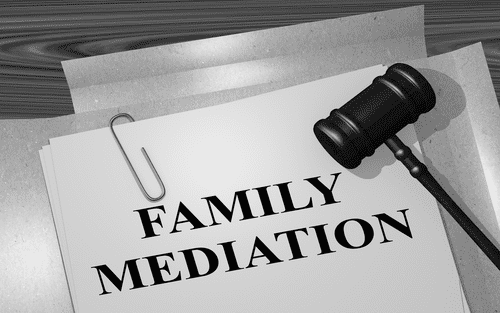If you plan on filing an action in North Dakota to resolve a dispute regarding parental rights and responsibilities you will be referred to the North Dakota State Family Mediation Program. Here is what you need to know about what it is and how it works.
Mediation
Mediation is a form of Alternative Dispute Resolution (ADR) involving a neutral third party (the mediator) who tries to help disputing parties reach a mutually agreeable solution. In other words, rather than having a hearing or a trial in which a judge makes a binding decision based on the evidence presented, in mediation an impartial third party listens to each litigant’s position, gives feedback based on their knowledge and experience, and relays offer back-and-forth between the parties in an attempt to resolve the issues amicably.
Mediation is voluntary. The parties are not forced to reach a resolution and always have the option to discontinue the negotiations if they don’t believe they will bear fruit.
Mediation involves informed decision-making. When at mediation, it is commonplace to request information regarding a position so that each party has all of the information they need in order to make a decision. This may include a party’s pay stubs in a case involving a child support action or a party’s drug test results in a case involving supervised parenting time. In some cases, outside experts are consulted, again, to make sure the parties feel comfortable when making decisions regarding the outcome of their case.
Mediation is also confidential. Mediators will not reveal anything said during mediation except as agreed to by the parties or as permitted by law. For instance, child sexual abuse or threats of harm to persons will not be held confidential, but a statement made regarding a position or strategy will be held in confidence by the mediator if you direct them to do so.
Family Mediation Program
The North Dakota Family Mediation program was put into place to provide a high-quality, impartial, and effective forum for resolving disputed parental rights and responsibility matters through mediation. The stated goal of the program is to “improve the lives of families and children who appear before the court by trying to resolve parental rights and responsibilities disputes through mediation in order to minimize family conflict, encourage shared decision-making, and support healthy relationships and communications among family members.”
North Dakota residents are fortunate to have the Family Mediation Program, not only because North Dakota has a system in place to help resolve these typically emotional disputes, but because North Dakota’s Mediation Program is FREE. Well, it is for the first six hours anyway. Out of the three states in which SW&L Attorneys practice family law, North Dakota is the only state that provides such a great service at such a low cost.
Timeline
Within 10 days of filing an action, the following cases are referred to the North Dakota Mediation Program: 1) Any civil proceeding in which there is a dispute or an unresolved issue regarding parental rights and responsibilities, relocation of a child, or grandparent visitation, including an original proceeding for a divorce, separation, or paternity in which the issue may appear; 2) Post-Judgment proceedings to modify parental rights and responsibilities, requesting to move a child from the state, or seeking grandparent visitation; 3) Certain guardianship proceedings, and 4) Any other case a judge deems appropriate.
Once the district court clerk has referred the matter to the Mediation Program, the judge assigned to the case will issue an Order assigning a mediator. This notice will provide the mediator’s name, address, and telephone number and give the parties 21 days to contact him or her regarding setting up a time for a pre-mediation orientation. Some mediators will do this orientation separately on a date prior to the mediation and some mediators in North Dakota will simply go through the orientation process on the date of the mediation.
Once the parties have contacted the assigned mediator, the mediator will send out potential dates and times to schedule the mediation. When you actually get into mediation will depend upon the mediator’s schedule and, if you want your attorney present, their schedule as well. Typically, mediations are set up within a month or two of the order assigning the mediator being issued.
Overall, the North Dakota Mediation Program is a great resource and should be used whenever possible if you have a family law issue. It can save the parties time and money if used properly. If you need assistance navigating the filing of an action to get you into the North Dakota Family Mediation Program, please contact us!










